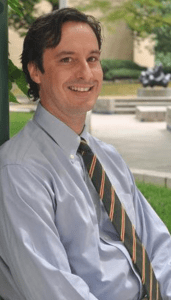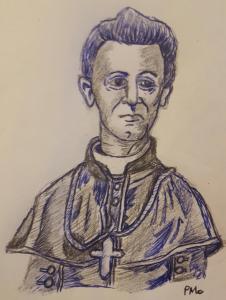 This new column in McNamara’s Blog profiles historians and archivists who make American Catholic history come alive through their work. They are preserving, chronicling and enhancing our understanding of the American Catholic experience, and they deserve recognition for this. Our first entry, then, profiles my friend Dr. James McCartin, who teaches in the theology department at Fordham University.
This new column in McNamara’s Blog profiles historians and archivists who make American Catholic history come alive through their work. They are preserving, chronicling and enhancing our understanding of the American Catholic experience, and they deserve recognition for this. Our first entry, then, profiles my friend Dr. James McCartin, who teaches in the theology department at Fordham University.
I’ve know Dr. McCartin for twenty years, since we were both graduate students at Collegium, an annual week-long program focusing on Catholic higher education. Today he’s regarded as one of the rising stars in American Catholic Studies. His first book, Prayers of the Faithful: The Shifting Spiritual Life of American Catholics, looked at how twentieth century American Catholics lived out their prayer lives, inside and outside church walls. One reviewer wrote: “ It should be read by anyone who wants to understand the American Catholic soul in the twenty-first century.”
A native of Troy, New York, Dr. McCartin attended local Catholic schools there. Like his father and his older brother Joseph, he studied at the College of the Holy Cross in Worcester, Massachusetts. (Today Dr. Joseph McCartin is a prominent labor historian teaching at Georgetown University.) One professor who strongly influenced him there was Dr. David O’Brien, one of the premier historians of American Catholicism.
Another important influence was a Christology course with Father William Reiser, S.J. This class, McCartin recalls, “transformed my faith experience.” It exploded “some old pious images,” he says, introducing him to the Jesus of the Scriptures: “It gave me access to a Jesus truly God and a human as well.” In his desire for a stronger prayer life, McCartin also made a week-long retreat based on the Spiritual Exercises of St. Ignatius Loyola, founder of the Jesuits.
After Holy Cross, McCartin worked briefly in Washington, D.C., before pursuing doctoral studies at the University of Notre Dame, the nation’s best program for American Catholic history. From an early age, he notes, he considered faith something with significant depth and meaning for people trying to make sense of their life experiences. History, he felt, could help fulfill this need.
Working at Notre Dame with Professors Scott Appleby and John McGreevy, McCartin became interested in the history of spirituality, specifically in the prayer lives of twentieth century American Catholics. His dissertation was published as a book in 2010. After Notre Dame, he taught at Seton Hall University before being named director of Fordham’s Center for Religion and Culture in 2011.
Dr. McCartin’s current research project focuses on American Catholics and sex from the 1830’s through the 1980’s. Part of the goal is to help discover the historical roots of the current sex abuse crisis. Young American Catholics, he notes, have grown up in a post-Vatican II, post-scandal Church, and there’s a need to place it all within the larger historical context. Dr. McCartin feels that the 2001 John Jay Report, which chronicled sexual abuse from the mid-twentieth century on, tends to give the impression that abuse only began with the sexual revolution of the sixties. “We need to go back a lot further,” he contends.
Dr. McCartin teaches a popular course at Fordham titled “Catholics in America,” which looks at the subject from a historical point of view. For students who approach the course from a Catholic upbringing, he stresses Catholicism as a tradition that can bring meaning to their lives and experiences. Faith, he contends, can inform and enhance our understanding. For those who approach the course from a different faith perspective (or none at all), he encourages them to take it seriously as a historical phenomenon that’s had a significant impact on the way institutions have developed.
In the long run, Dr. McCartin hopes his research will benefit the Church as a whole. Like everyone else, American Catholics as a whole can benefit from better knowing their own history. There’s a need, he argues, for the community “to tell stories about itself,” and to learn from those stories. In doing so, they can ultimately make sense and find a deeper meaning in their collective experience as Catholics in America.










